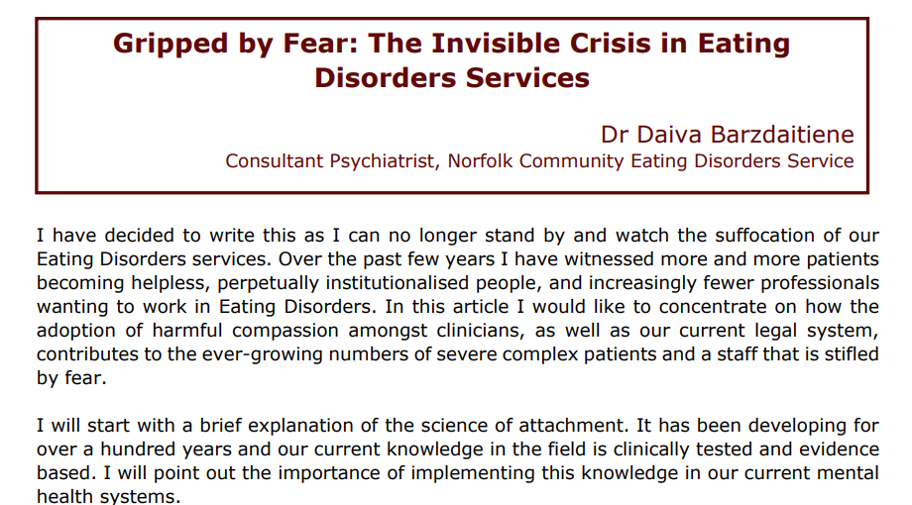For anyone who wonders why I advocate so hard for those with eating disorders (EDs), especially in the context of treatment access and with respect to Medical Assistance in Dying (MAiD), this article, in a nutshell, is it:
In August 2022, Dr. Davia Barzdaitiene (Consultant Psychiatrist, Norfolk Community Eating Disorders Service) wrote an opinion piece regarding the treatment of eating disorders that was published by the Royal College of Psychiatrists.

It is a devastating example of how misunderstood and demeaned eating disorders are among people in the highest positions of power. The support by the Royal College in publishing this piece, referring to it as a valid perspective, and then shutting down comments is outrageous and unethical.
A few excepts from Dr. Barzdaitiene:
(you may want to sit down with a weighted blanket before reading this)
She begins early on questioning why we bother “chasing” those who suffer, alluding to this act as a waste of resources:
“Why do we use resources in chasing them, begging them ‘to take a bed’, ‘rescuing’ them when they have no wish to be treated? Especially when these countless attempts to treat people who do not want to change take away resources from the people who have recently developed an eating disorder and could be helped.”
She goes on to say that: “There is an attitude in the mental health system in the UK that no one should die from an eating disorder” but argues that this is unlikely given that (EDs) are “not caused by a lack of food and cannot be treated with re-feeding.” Please note that I cannot find the appropriate emoji to enter at this point that would adequately express my horror, anger, and disgust).
In another section, she exerts the very damaging position that clinicians are always doing their best and should not be scrutinized or held accountable should treatment fail:
“I saw devoted clinicians going off sick or leaving their jobs, and the service faced difficulties in recruiting. The press took joy in describing the faults of the service and had little interest in describing the hard work that the clinicians were doing every day in trying to treat and support their patients. The service was gripped by fear. Mental Health teams, General Practitioners, colleagues from Acute Trusts should be respected for their hard work and not blamed if a person dies from an eating disorder.” WHAT?! Blaming patients for not responding adequately to your treatment means stepping back and looking at your treatment model. It means doing more research, talking to your clients, getting consultation from outside providers, it means doing better and trying harder. But blaming patients for putting ED teams in a state of fear?! Inappropriate, to say the least. In my experience, this is an indication that there is something seriously wrong with the team’s functioning or the program itself, not the patients.
But there is more! She states that “the majority of eating disorders and general mental health patients have insecure attachment and/or lack of resilience in their background.” I mean, one need only look at the large literature on the genetics and biology of EDs to know these aren’t attachment disorders. It is extremely concerning that the conceptualization of an ED negates the well studied influence of neuro-metabolic anomalies, the brain differences that control reward/punishment, sensation, perception, threat sensitivity, and the extensive trauma our clients have endured. Again, I reiterate that eating disorders are not attachment disorders.
Finally, Dr. Barzdaitiene makes a number of recommendations one of which is:
“If the longevity of a disorder is more than 5 years, only people who ask for help should be treated in Eating Disorders services. Brief medical admissions for stabilization should be available to everybody but only on a voluntary basis.”
This is a PSYCHIATRIST who is part of an ED program who seems to lack all understanding of the neurometabolic and brain-based underpinnings of EDs and who sees no value in exploring what might need to be modified with their approach because the blame is really on the patient.
How can you provide effective treatment if this is your belief system? At one point in the article, she reflects on the realization that she doesn’t in fact like one of her patients. This is unbelieve to me. Even more concerning is the fact that these will be some of the people signing off on medical assistance in dying for those suffering in our community. How easy will it be to sign off when you don’t think feeding people is helpful, patient blaming is part of the picture, one has a 5 year window to get better, the actual treatment their patients receive is unclear, and you are unwilling to process and work on how to change your team’s approach to these complex illnesses in line with a rapidly evolving evidence base?
Fortunately, Dr Agnes Ayton, MD, FRCsych, MMedSc, MSc Chair of Faculty of Eating Disorders, RCPsych wrote an opposing piece challenging the dangerous and misguided statements made by Dr. Barzdaitiene.
Regardless, I fear that too many healthcare providers in positions of power hold these scathing views. I sure wouldn’t want my loved ones treated by this person or this team but how many people are able to choose who treats them? This is a College and a systems issue that requires a retraction of the opinion piece, an apology to all those it harms, and at minimum a retraining for this team in ED science. It doesn’t seem that working in this field is much of a calling for this psychiatrist. I am disgusted to say the least.
The full article can be found here: autumn-2022-final.pdf (rcpsych.ac.uk)
For anyone who needs to breathe and regroup, sending you some mountains as a sign that we can overcome hard things!
Not going to let this person’s views drag down that we are changing this damn system, one little step at a time.
Anita xo

